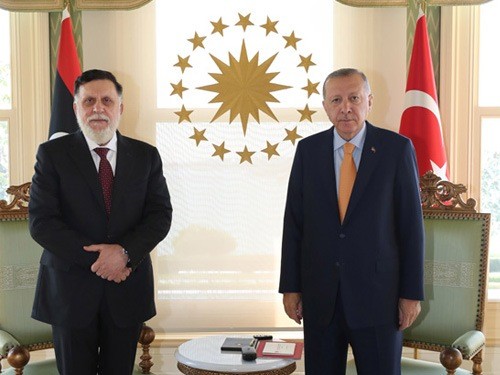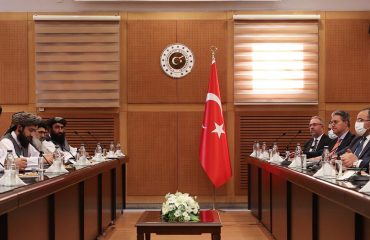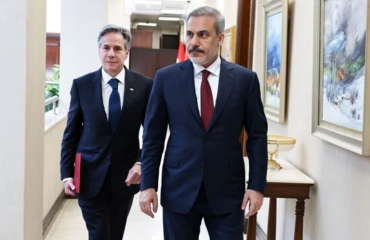

Turkey has been trying to break the France-Greece axis in the Eastern Mediterranean with intense diplomacy, while also trying to display its determination with a joint military drill with Turkish Cyprus, a move that has already irked Greece.
Turkey’s recent regional diplomatic moves, mainly undertaken by President Recep Tayyip Erdoğan over the weekend, seek a crack within the European Union at a time when both Ankara and Brussels have lost many of their carrots to offer but have been increasing the number of sticks they hold.
Turkey’s focus is shifting to France from Greece, which is already deprived of a concrete U.S. support in its eastern Mediterranean bid.
Sending Libya message to France
It is no secret that Ankara and Paris have been on different pages in the Libya conflict: France has supported General Khalifa Haftar’s Libyan National Army, as Turkey stands by the U.N.-recognized Government of National Accord and its leader Fayez al-Sarraj.
Erdoğan welcomed al-Sarraj in Istanbul over the weekend, sending a clear message that the two parties will stand behind a November 2019 mutual deal on maritime borders, which was a milestone in the recent Med Sea tensions.
“The meeting addressed the steps to protect the rights of Turkey and Libya in the Eastern Mediterranean and terms to strengthen the cooperation under the deal signed between the two countries as well,” according to a statement issued by Turkey’s Directorate of Communications on Sept. 6.
This is one of Turkey’s strongest trump cards against France, considered that Ankara’s stance finds support within the EU, with Italy also backing the al-Sarraj government.
On Sept. 4, Erdoğan had also met with Nechirvan Barzani of the Kurdish Regional Government (KRG), the autonomous Iraqi administration, in Ankara. This was yet another message that wanted to highlight Turkey’s role as a regional player.
Toward European Council meeting
Still last week, Erdoğan spoke on the phone with German leader Angela Merkel, who wants to play a mediator role in the Eastern Mediterranean, and complained about France to Berlin’s EU partner. According to news reports, Erdogan told Merkel that “We are having difficulty understanding France. What is the purpose of France? What does France have to do with the Eastern Mediterranean crisis? Why is that (French) aircraft carrier coming here?”
Responding to a French move to deploy Charles De Gaulle, its first nuclear-powered aircraft carrier, to the Eastern Mediterranean Sea, Turkey brought forward the Martyr Capt. Cengiz Topel Mediterranean Storm Exercise with Turkish Cyprus. The planned drill was held in October last year, but the two countries launched it on Sept. 7 this year, which is before a European Council meeting on Eastern Mediterranean tensions.
Erdogan’s other phone conversation was with the President of the European Council, Charles Michel. While Erdoğan demanded neutrality from the EU and asked European leaders to avoid provocative statements, Michel said the EU would “consider all measures.”
However, Europe now has to count carefully how many sticks it holds, given that many of the traditional “measures” would not wort at a time when the Med Sea issue has turned into a domestic politics headline in Turkey. Still, last weekend’s diplomatic moves signal that Turkey is not totally deaf to European stance ahead of the European Council meeting.
‘Who is provoking Greece?‘
Turkey has targeted France not only in EU platforms but also in NATO. While explaining that it wan Greece, not NATO, who lied about the start of technical talks at the Alliance for a Med Sea resolution, Turkish Foreign Minister Mevlüt Çavuşoğlu did not miss a chance on Sept. 4 to slam Paris: “Who provokes Greece the most? France. France has some other concerns. What does France have to do with the Eastern Mediterranean?” Çavuşoğlu asked, echoing Erdoğan.
NATO talks on the way but…
The first key meeting on Sept. 7 was between Turkish Defense Minister Hulusi Akar and Air Chief Marshal Stuart Peach, Chairman of the NATO Military Committee. It came after NATO Secretary-General Jens Stoltenberg announced that technical negotiations between Turkey and Greece would begin. Still, the military exercises by all related sides and the French interference are likely to shadow the initiative and shift the focus of the debates from the east of the Med Sea to the west.
Akar had also joined Ankara’s France-bashing, saying that “France thinks it can do whatever comes to its mind. Its statements are not limited to the Eastern Mediterranean and are expanding to Iraq. None of this contributes to the spirit of alliance, to peace or dialogue.”
Akar argues that France has nothing to do with the region, it has no borders, it does not have any representation authority stemming from agreements. He also says it also cannot represent NATO or the EU.
No carrots, many sticks
The second important meeting on Sept. 7 was the cabinet meeting in Ankara, where Erdoğan would brief the ministers on “Turkey’s activities in the Eastern Mediterranean Sea, the joint exercise with Turkish Cyprus, strained relations with Greece, NATO’s engagement in the Greek-Turkish crisis, the French stance on the issue and German efforts for mediation,” according to report on daily Milliyet. Erdoğan is also expected to inform the cabinet on his meetings with the German and Libyan leaders
The meeting might also handle the effects of the current Med Sea tensions on domestic politics but Turkey also has the count the number of carrots and sticks it has in EU relations.
In the absence of carrots such as new trade agreements, the joint development of Mediterranean resources, a joint refugee policy, the resumption of EU accession talks that seem to have remained centuries ago, tourism, and even joint measures against the pandemic, sticks seem to dominate the equation for both sides.


